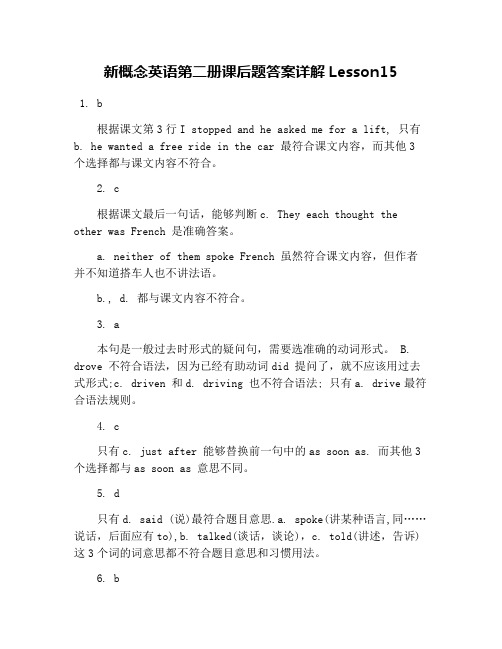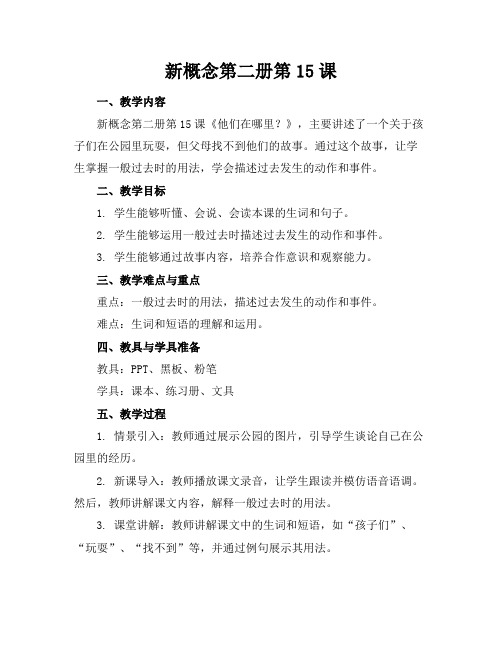新概念第二册第15课
新概念英语第二册课后题答案详解Lesson15

新概念英语第二册课后题答案详解Lesson151. b根据课文第3行I stopped and he asked me for a lift, 只有b. he wanted a free ride in the car 最符合课文内容,而其他3个选择都与课文内容不符合。
2. c根据课文最后一句话,能够判断c. They each thought the other was French 是准确答案。
a. neither of them spoke French 虽然符合课文内容,但作者并不知道搭车人也不讲法语。
b., d. 都与课文内容不符合。
3. a本句是一般过去时形式的疑问句,需要选准确的动词形式。
B. drove 不符合语法,因为已经有助动词did 提问了,就不应该用过去式形式;c. driven 和d. driving 也不符合语法; 只有a. drive最符合语法规则。
4. c只有c. just after 能够替换前一句中的as soon as. 而其他3个选择都与as soon as 意思不同。
5. d只有d. said (说)最符合题目意思.a. spoke(讲某种语言,同……说话,后面应有to),b. talked(谈话,谈论),c. told(讲述,告诉)这3个词的词意思都不符合题目意思和习惯用法。
6. ba. many 很多, c. plenty of 充足的,都不用来修饰某种语言.b. much 很多,和 d. a little 都可用在某种语言前面,但 alittle 不能用在否定句中,不可说 I don't know a little French.所以选b.7. c只有c. both didn't speak 语法准确,而其他3个选择都有语法错误,所以我们只能选c.8. b前一句中的短语on the way 是“在路上”的意思,只有b.during the writer’s journey(在作者旅途中)同这个短语意思最接近,而另外3个选择都与它的意思不同。
新概念英语第二册:第15课课文详解及语法解析

【导语】新概念英语之所以经久不衰是因为以其全新的教学理念,有趣的课⽂内容和全⾯的技能训练,为英语学习者排忧解难,深受⼴⼤英语学习者的欢迎和喜爱。
想要学好英语的你,怎能错过?快来加⼊学习吧!为您提供,希望以下内容能够为⼤家的新概念英语学习提供帮助! 课⽂详注 Further notes on the text 1.The secretary told me that Mr. Harmsworth would see me. 秘书告诉我说哈姆斯沃斯先⽣要见我。
would 在这⾥不是表⽰单纯的过去将来时,⽽是表⽰“想……”、“要……”的意思: What would you like to have? 你想要吃(喝)什么? John wouldn't lend me his bicycle. 约翰不愿意把他的⾃⾏车借给我。
2.He did not look up from his desk when I entered. 我进去的时候,他连头也没抬。
在这句话的look up中,look是它的本义“看”、“瞧”。
look up⼀般表⽰原先在埋头⼲什么之后抬头看: He looked up (from his book) when he heard a noise. 他听到声⾳后就抬起了头。
(原先在读书) 3.I knew that my turn had come. 我知道这次该轮到我了。
turn在这⾥是名词,意为“轮流”、“轮班”、“(依次轮流时各⾃的)⼀次机会”: I have already asked two questions. Now it's your turn. 我已经问了两个问题。
该轮到你了。
When his turn came, he couldn't speak any word. 轮到他时,他却⼀个字也说不出来。
4.'Mr. Harmsworth,' I said in a weak voice. “哈姆斯沃斯先⽣,”我⽆⼒地说。
新概念第二册第15课课件

THANKS
THANK YOU FOR YOUR WATCHING
02
03
略读技巧
教授学生如何快速浏览文 章,抓住文章大意,提高 阅读速度。
寻读技巧
训练学生如何在文章中快 速找到特定信息,如时间 、地点、人物等。
精读技巧
引导学生深入理解文章, 分析作者观点,评价文章 价值。
阅读理解题目解析
01
02
03
04
细节理解题
针对文章中的具体细节进行提 问,要求学生准确理解并回答
04
阅读理解与技巧提升
阅读材料选择与解读
选择具有代表性的文章
选择涉及不同领域的文章,如历史、科学、文化等,以拓宽学生 的阅读视野。
注重文章结构与逻辑
引导学生分析文章结构,理解段落间的逻辑关系,把握文章主旨。
解读重点词汇与短语
讲解文章中的重点词汇和短语,帮助学生理解文章细节。
阅读技巧分享与训练
01
实战演练二
写一篇记叙文,讲述自己 与家人或朋友之间发生的 一件感人至深的事情。
实战演练三
根据所给材料,编写一则 新闻报道。
优秀作品展示与学习
作品一览
展示若干篇优秀的学生作品,供 大家学习和借鉴。
亮点分析
对每篇优秀作品进行详细点评, 分析其优点和特色。
互动交流
邀请同学们分享自己的写作心得 和体会,促进相互学习与成长。
听力材料解读
引导学生先听后读,通过图片、文字等多种形式解读听力材料,帮助学生深入 理解听力内容。
听力技巧分享与训练
预测与推断
训练学生根据上下文、关键词等预测与推断听力内容的能力 ,提高听力理解的准确性。
速记与整理
教授学生有效的速记方法,如缩写、符号等,帮助学生快速 捕捉关键信息,提高听力记录的效率。
新概念第二册第15课

新概念第二册第15课一、教学内容新概念第二册第15课《他们在哪里?》,主要讲述了一个关于孩子们在公园里玩耍,但父母找不到他们的故事。
通过这个故事,让学生掌握一般过去时的用法,学会描述过去发生的动作和事件。
二、教学目标1. 学生能够听懂、会说、会读本课的生词和句子。
2. 学生能够运用一般过去时描述过去发生的动作和事件。
3. 学生能够通过故事内容,培养合作意识和观察能力。
三、教学难点与重点重点:一般过去时的用法,描述过去发生的动作和事件。
难点:生词和短语的理解和运用。
四、教具与学具准备教具:PPT、黑板、粉笔学具:课本、练习册、文具五、教学过程1. 情景引入:教师通过展示公园的图片,引导学生谈论自己在公园里的经历。
2. 新课导入:教师播放课文录音,让学生跟读并模仿语音语调。
然后,教师讲解课文内容,解释一般过去时的用法。
3. 课堂讲解:教师讲解课文中的生词和短语,如“孩子们”、“玩耍”、“找不到”等,并通过例句展示其用法。
4. 实践环节:教师组织学生进行角色扮演,模拟故事中的情景,让学生运用一般过去时描述动作和事件。
5. 随堂练习:教师发放练习册,让学生完成相关的练习题,巩固所学知识。
7. 作业布置:教师布置作业,让学生运用一般过去时写一篇小作文。
六、板书设计黑板上写出一句话:“他们在哪里?”然后,教师通过板书,将句子变成一般过去时的形式:“他们在哪里?”七、作业设计1. 作业题目:请用一般过去时写一篇关于你在公园里玩耍的小作文。
2. 作业答案:(示例)昨天,我和我的朋友们一起去公园玩耍。
我们跑了很长时间,玩得非常开心。
但是,当我们想找我们的父母时,我们发现他们不见了。
我们到处找他们,但找不到。
我们决定去附近的餐馆找他们,因为他们说要给我们买冰淇淋。
当我们到达餐馆时,我们终于找到了他们。
他们都坐在那里等着我们,我们非常高兴。
八、课后反思及拓展延伸本节课通过一个有趣的故事,让学生掌握了一般过去时的用法。
新概念英语青少版第二册第15课The weighing machine

新概念英语青少版第二册第15课The weighing
machine
Revision Lesson 15 The weighing machine
复习课15 磅秤
Narrator: Sandy and Sue are coming home from school.
桑迪和苏正从学校回家
They meet Professor Boffin.
他们遇见了伯菲教授
Narrator: Professor Boffin is taking his coat off.
伯菲教授正在脱大衣
Sandy: What are you going to do,Professor Boffin?
伯菲教授,您干什么呀
Professor: I'm going to weigh myself,Sandy.
桑迪,我想称称体重
Sue: Where?
在哪里称
Professor: I'm going to weigh myself on this weighing machine.
就在这个磅秤上称
Professor: I'm going to put a penny in the slot.
我要把一便士塞进那个口子
There! (Sandy and Sue laugh.)
进去了 (桑迪和苏笑了起来)
Professor: What's the matter,children?
孩子们,怎么了?
Sue: You're still holding your coat,Professor Boffin! 伯菲教授,您还拿着大衣呢!。
新概念英语第二册第十五课作文

新概念英语第二册第十五课作文英文回答:The concept of time is an abstract and complex dimension that has intrigued philosophers, scientists, and artists for centuries. It is an essential element of our reality that governs our experiences and perceptions of the world around us. Time, like space, has been a fundamental topic in philosophical inquiry.In the 15th lesson of New Concept English, we explore the theme of time through the lens of various perspectives and experiences. We reflect on the subjective nature of time, its relationship to memory and change, and its impact on our lives.The passage begins by presenting the concept of time as a "river of events" that flows continuously and irreversibly. It's a metaphor that captures the dynamic and relentless nature of time, reminding us that we areconstantly moving forward, leaving behind the past and embracing the future.The lesson then delves into the subjective perceptionof time, highlighting that our experiences can influence how we perceive its passage. Time can seem to stretch or compress, depending on our emotional state or theactivities we are engaged in. This subjective nature oftime was famously captured by Albert Einstein in his theory of relativity, which showed that time is not absolute but relative to the observer.Memory plays a crucial role in our understanding of time. Our memories allow us to remember past events, relive them in our minds, and connect them to the present. However, memories can also be selective and distorted, shaping our perception of the past and potentially influencing our view of the future.Time is closely intertwined with the concept of change. As time passes, things change around us and within us. Changes can be gradual or abrupt, positive or negative, butthey are an inevitable part of life. The lesson encourages us to embrace change and to find opportunities for growth and renewal within its cycles.The impact of time on our lives is multifaceted. It influences our physical, emotional, and psychological well-being. As we grow older, our bodies change, our minds mature, and our perspectives on life evolve. Time can be both a source of joy and sorrow, offering us newexperiences and opportunities but also reminding us of loss and the transience of life.In conclusion, the concept of time is vast and multifaceted, encompassing both objective and subjective dimensions. It is a river of events that flows continuously, a subjective experience that can be shaped by our memories and emotions, and a force that brings both change and continuity to our lives. As we navigate the complexities of time, it is important to appreciate its profound influence on our experiences and to find ways to live in harmony with its rhythms.中文回答:时间是一个抽象而复杂的概念,几个世纪以来一直让哲学家、科学家和艺术家着迷不已。
Lessons15新概念英语第二册课后答案详解

【导语】新概念英语⽂章短⼩精悍,语句幽默诙谐,语法全⾯系统。
适合各个阶层的⼈群学习参考。
相信有了新概念英语,你也可以成为“⼤神”级别的⼈物!还在等什么?快来加⼊学习吧!⼩编与您⼀起学习进步! 新概念英语第⼆册第15课词汇学习 Word study nervous adj. (1)神经质的,神经紧张的: She is a nervous woman. Do you see that nervous smile on her face? 她是个神经质的⼥⼈。
你看见她脸上那种神经质的微笑了吗? (2)紧张的,担⼼的,情绪不安的: I feel very nervous before exams. 我在考试前感到⾮常紧张。
He had never spoken in public, so he was very nervous. 他从未当众讲过话,因此他⾮常紧张。
(3)与nervous容易混淆的另⼀个词是 irritable(易怒的,急躁的): Our teacher is an irritable old lady. She gets angry easily. 我们的⽼师是位脾⽓急躁的⽼太太。
她很容易⽣⽓。
afford vt. (1)买得起(常与can连⽤): We can/can't afford a car this year. 我们今年买得起/买不起⼩汽车。
(2)担负得起(损失、后果等),花得起(时间)(常与can连⽤): I can't afford to be ill again. 我不能再病了。
I can only afford one week for the trip. 我只能为这次旅⾏抽出⼀周的时间。
(3)提供,给予: Joe afforded us a room for the night. 那天晚上乔为我们提供了⼀个房间过夜。
新概念英语第⼆册第15课练习答案 Key to written exercises 1.关键句型练习答案 A 1a The secretary told me that Mr. Harmsworth would see me. b'Mr. Harmsworth will see you. ' 2 a Mr. Harmsworth said that business was very bad. b 'Business is very bad.' 3 a Mr. Harmsworth told me that the firm could not afford to pay such large salaries. b 'The firm cannot afford to pay such large salaries. ' B 1 told… would come/would be coming 2 said…(had) cut 3 told… had never played 4 did he say…had done/would do 5 did he tell…(had) bought/would buy 6 said…could not 7 said…(had) worked 8 told…wrote/writes/had never written 9 did you say…were/had been 10 said…would wait 2.难点练习答案1 study2 office3 nervous4 afford5 irritable 3.多项选择题答案 1d 2b 3c 4b 5c 6d 7a 8d 9c 10c 11c 12b。
《新概念英语》第二册第十五课课文

《新概念英语》第二册第十五课课文
Good news
The secretary told me that Mr Harmsworth would see me. I felt very nervous when I went into his office. He did not look up from his desk when I entered. After I had sat down, he said that business was very bad. He told me that the firm could not afford to pay such large salaries. Twenty people had already left. I knew that my turn had come. 'Mr Harmsworth,' I said in a weak voice.' Don't interrupt,' he Said. Then he smiled and told me I would receive an extra &1000 a year!
翻译:
佳音
秘书告诉我说哈姆斯沃斯先生要见我。
我走进他的办公室,感到非常紧张。
我进去的时候,他连头也没抬。
待我坐下后,他说生意非常不景气。
他还告诉我,公司支付不起这么庞大的工资开支,有20个人已经离去。
我知道这次该轮到我了。
“哈姆斯沃斯先生,”我无力地说。
“不要打断我的话,”他说。
然后他微笑了一下告诉我说,我每年将得到1,000 英镑的额外收入。
新概念英语第二册第15课-Good news

新概念英语第二册第15课:Good newsLesson 15 Good news佳音First listen and then answer the question.听录音,然后回答以下问题。
What was the good news?The secretary told me that Mr Harmsworth would see me. I felt very nervous when I went into his office.秘书告知我说哈姆斯沃斯先生要见我。
我走进他的办公室,感到特殊紧急。
我进去的时候He did not look up from his desk when I entered. After I had sat down, he said that business was very bad.他连头也没抬。
待我坐下后,他说生意特殊不景气He told me that the firm could not afford to pay such large salaries. Twenty people had already left.他还告知我,公司支付不起这么浩大的工资开支,有20个人已经离去I knew that my turn had come.我知道这次该轮到我了Mr Harmsworth I said in a weak voice.“哈姆斯沃斯先生” 我无力地说Dont interrupt he Said.“不要打断我的话” 他说Then he smiled and told me I would receive an extra 1000 a year!然后他微笑了一下告知我说,我每年将得到1,000 英镑的额外收入!New words and expressions 生词和短语secretaryn. 秘书nervousadj. 精神紧急的affordv. 负担得起weakadj. 弱的interruptv. 插话,打断Notes on the text课文解释1 look up,抬头看。
新概念英语第二册 第15课课后题

1.‘I am busy,’ he said. He says that he is busy. He said that he was busy. He told me that he was busy. 2.‘I never work on Sundays,’she She says that she never works-She said that she never worked-
‘I broke that plate,’ he said. He says that he broke that plate. He said that he had broken ---. He told me that he had broken---. Mr. Jones will see you now ,(she) She says that Mr. Jones will---. She said that Mr.Jones would---. She told me that Mr. Jones would.
6.How many people had left already? Twenty people 7.Did he ask you to leave as well or not? He didn’t ask me to leave. 8.What did he offer you? He offered me an extra thousand a year.
8.He told me he never written . (write) letters to anybody. 9.Why did you say that youwere . (be) busy. 10.He said that he would wait . (will wait )for me.
新概念第二册第15课课件

新概念第二册第15课课件一、课程导入在开始今天的课程之前,让我们先一起回顾一下上节课学习的内容。
通过上节课的学习,我们掌握了一些重要的语法点和词汇。
那么,今天我们将一同走进新概念第二册的第 15 课,看看这一课又会给我们带来怎样的新知识和新挑战。
二、课文内容第 15 课的课文题目是“Good news”(好消息)。
这篇课文主要讲述了一位秘书向经理汇报工作的情景。
The secretary told the manager that she had typed the letters But the manager was very angry because he found some mistakes in the letters (秘书告诉经理她已经把信打好了。
但是经理非常生气,因为他在信中发现了一些错误。
)The secretary said that she would be more careful in the future Then the manager told her that they were going to have a big meeting next week and she had to prepare all the documents (秘书说她以后会更仔细。
然后经理告诉她下周他们要开一个大型会议,她必须准备好所有的文件。
)三、重点词汇1、secretary :秘书,这个单词的发音要注意,重音在第二个音节。
2、 type :打字,过去式和过去分词分别是“typed”。
3、 mistake :错误,常用的短语有“make a mistake”(犯错误)。
4、 careful :仔细的,小心的,其反义词是“careless”(粗心的)。
5、 document :文件,文档。
四、重点语法1、过去完成时构成:had +过去分词用法:表示过去某个时间或动作之前已经完成的动作。
新概念英语2——第15课

I've never eaten such delicious food.
3.Twenty people had already left. I knew that my turn had come. 'Mr. Harmsworth,' I said in a weak voice. 'Don't interrupt,' he said. My turn has come.(书面语) It‘s my turn.(口语) • in a ... Voice 用……的声音 in a loud(大声)/low(低声)/weak(强调 心理不踏实)/strong (理直气壮)voice
总结
主句 现在时 一般现在 从句 现在完成 过去时 一般过去 过去完成
一般将来
一般过去
过去将来
过去完成
总结:去掉逗号和引号, 主从之间加that, 人称代词要转换, 谓语动词跟着变, 时态一定要注意, 主从变化要一致。
直接引语改为间接引语时, 人称代词和物主形容词应 该作适当的变化。地点和时间状语也应作相应改变。
3 .直接引语中的第二人称,如果原话是针对第三人称说的, 转换成第三人称。如: She said to her son, “I'll check your homework tonight.” ——> She said to her son that she would check his homework that night. 4. 人称的转换包括人称代词、物主代词和名词性物主代词等。 如: He asked me, “Will you go to the station with me to meet a friend of mine this afternoon?” ——> He asked me whether I would go to the station with him to meet a friend of his that afternoon.
